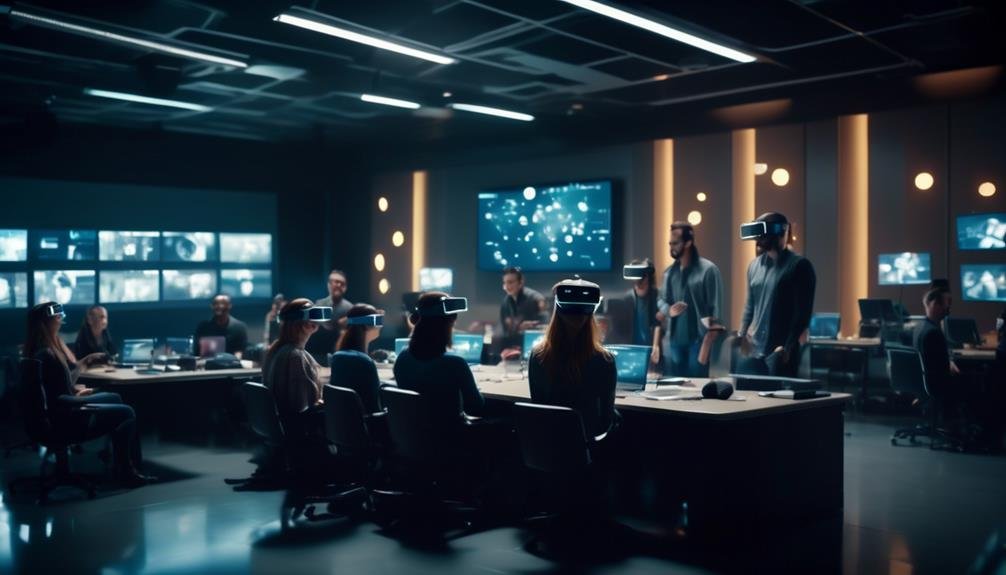Exploring the Latest Trends in Corporate Learning and Development
In today's fast-paced corporate environment, the landscape of learning and development is constantly evolving to meet the needs of a dynamic workforce. As organizations strive to remain competitive and adapt to rapidly changing technologies and market demands, it becomes imperative to stay informed about the latest trends shaping corporate learning and development.
From personalized learning pathways to the integration of virtual reality and the utilization of artificial intelligence, there are several key developments that are reshaping the way organizations approach employee training and skill development. These trends are not only influencing the way training programs are designed and delivered but also impacting the overall effectiveness and relevance of corporate learning initiatives.
Key Takeaways
- Personalized learning and development is a key trend in corporate training, focusing on customized coaching, individualized training, and tailored learning experiences to meet the unique needs and goals of each employee.
- The integration of technology, such as virtual reality and artificial intelligence, is revolutionizing corporate learning and development strategies, offering immersive training experiences, personalized content delivery, and adaptive assessments.
- Assessment and tracking methods are becoming more personalized and effective, with the use of adaptive assessments, real-time performance tracking, and personalized feedback, providing valuable insights into learning progress and areas of improvement.
- Content customization and a focus on skills and data are important trends, with microlearning strategies breaking down learning content into smaller segments, data-driven decision making optimizing training programs, and an emphasis on developing soft skills for productivity and collaboration.
Personalized Learning Pathways
The implementation of personalized learning pathways has become increasingly prevalent in corporate training and development programs as organizations seek to tailor learning experiences to individual employee needs and goals. Customized coaching and individualized training are integral components of this approach, allowing organizations to address the unique requirements and learning styles of each employee.
By leveraging customized coaching, employees receive personalized guidance and support, enabling them to develop skills and competencies at their own pace and based on their specific areas of improvement. Individualized training ensures that learning content is relevant and targeted, maximizing the impact of the training experience.
This tailored approach fosters a more engaged and motivated workforce, leading to enhanced performance and productivity. Moreover, personalized learning pathways empower employees to take ownership of their professional development, leading to a more proactive and self-directed approach to learning.
As organizations continue to recognize the value of personalized learning pathways, the trend towards customized coaching and individualized training is expected to further evolve, driving continuous improvement in corporate learning and development initiatives.
Integration of Virtual Reality
Amid the burgeoning emphasis on personalized learning pathways in corporate training and development, the integration of virtual reality has emerged as a cutting-edge approach to enhance employee engagement and learning outcomes.
Virtual reality applications offer immersive training experiences that allow employees to simulate real-world scenarios in a safe and controlled environment. This technology enables learners to interact with 3D environments, manipulate objects, and engage in lifelike simulations, thus deepening their understanding and retention of complex concepts.
By integrating virtual reality into corporate learning and development programs, organizations can provide employees with hands-on training experiences that are otherwise difficult to replicate in traditional classroom settings.
Moreover, virtual reality applications have the potential to significantly reduce training costs by minimizing the need for physical resources and travel. Employees can access immersive training experiences remotely, saving time and resources while still benefiting from high-quality, interactive learning.
As the technology continues to advance, the integration of virtual reality is poised to revolutionize corporate training and development by offering unparalleled levels of engagement, interactivity, and knowledge retention.
Utilization of Artificial Intelligence
Artificial Intelligence (AI) is revolutionizing corporate learning and development through its ability to personalize training programs, making them more effective and engaging for employees.
Additionally, AI enables the creation of adaptive assessments that can accurately gauge an individual's skills and knowledge, leading to targeted learning experiences.
The utilization of AI in corporate learning and development is paving the way for a more efficient and tailored approach to employee training.
AI in Training
With the rapid advancement of technology, the integration of artificial intelligence into corporate training programs has become a pivotal aspect of modern learning and development strategies. AI-powered simulations and interactive chatbots are revolutionizing the way employees are trained. The use of AI in training allows for personalized and adaptive learning experiences, catering to individual needs and learning styles. AI-powered simulations provide employees with realistic scenarios to practice and apply their skills in a safe environment. Additionally, interactive chatbots offer instant support and guidance, providing learners with on-demand assistance throughout their training. This technology not only enhances the effectiveness of training programs but also significantly reduces the time and resources required for employee development.
| AI in Training | Benefits | Examples |
|---|---|---|
| AI-powered simulations | Realistic scenarios for skill practice | Virtual reality training modules |
| Interactive chatbots | On-demand support and guidance | Virtual mentors |
Personalized Learning
The implementation of artificial intelligence to facilitate personalized learning in corporate training programs has redefined the approach to employee development, tailoring learning experiences to individual competencies and preferences.
Adaptive learning, a key aspect of personalized development, is made possible through AI algorithms that analyze employee performance data and provide customized learning paths. By leveraging AI, training programs can adapt in real time to meet the specific needs of each employee, ensuring that they receive the most relevant and impactful learning materials.
This tailored approach not only enhances employee engagement and motivation but also maximizes the efficiency of learning, ultimately leading to improved skill acquisition and retention.
As AI continues to advance, the potential for even more sophisticated personalized learning experiences in corporate settings is on the horizon.
Adaptive Assessments
How can corporate learning and development benefit from the utilization of adaptive assessments powered by artificial intelligence? Adaptive assessments, driven by artificial intelligence, offer a more personalized and effective approach to evaluating employees' skills and knowledge. By utilizing AI algorithms, these assessments can dynamically adjust the difficulty of questions based on the individual's responses, providing a more accurate measure of their capabilities. Additionally, they can offer personalized feedback and recommendations for further learning, catering to each employee's specific developmental needs. This not only enhances the learning experience but also optimizes the use of resources by focusing on areas where improvement is needed. The table below illustrates the key benefits of adaptive assessments in corporate learning and development.
| Benefits of Adaptive Assessments |
|---|
| Personalized Learning Paths |
| Real-time Performance Tracking |
| Enhanced Learning Outcomes |
Adaptive Learning Platforms
Adaptive learning platforms are revolutionizing corporate learning by offering personalized learning paths tailored to individual needs.
These platforms also provide real-time performance tracking, allowing for immediate feedback and adjustment.
Moreover, content customization options enable organizations to deliver targeted and relevant training materials to their employees.
Personalized Learning Paths
Frequently, modern corporate learning and development initiatives are embracing personalized learning paths through adaptive learning platforms to cater to the diverse needs of employees. This approach allows for personalized learning styles and individualized skill development, ensuring that employees receive tailored content and training based on their specific needs and learning preferences. By leveraging adaptive learning platforms, organizations can provide a more targeted and effective learning experience, ultimately leading to improved knowledge retention and skills acquisition. Below is a representation of the benefits of personalized learning paths:
| Benefits of Personalized Learning Paths |
|---|
| 1. Enhanced Engagement |
| 2. Improved Knowledge Retention |
| 3. Tailored Skill Development |
Real-Time Performance Tracking
Real-time performance tracking within adaptive learning platforms builds upon the foundation of personalized learning paths by providing ongoing assessment and feedback to employees as they engage with tailored content and training. These platforms enable real-time feedback mechanisms that allow for instant analysis of learner performance.
By leveraging performance analytics, organizations can gain valuable insights into individual and group learning progress, identify areas of strength and improvement, and make timely interventions as necessary. This approach not only enhances the learning experience for employees but also empowers organizations to adapt and optimize their training programs in response to real-time performance data.
As a result, real-time performance tracking within adaptive learning platforms serves as a powerful tool for driving continuous improvement and maximizing the impact of corporate learning and development initiatives.
Content Customization Options
Customization options within adaptive learning platforms allow organizations to tailor content and training to meet the specific learning needs of individual employees. This approach to learning personalization enables customized content delivery, ensuring that employees receive the most relevant and impactful training materials.
Adaptive learning platforms use data-driven insights to identify each employee's strengths, weaknesses, and learning preferences. With this information, the platforms can dynamically adjust the content and delivery method to optimize the learning experience for each individual.
By offering customized content delivery, organizations can enhance employee engagement, accelerate skill development, and improve retention of knowledge. Furthermore, personalized learning experiences can lead to greater overall satisfaction and productivity within the workforce.
As a result, adaptive learning platforms are becoming increasingly valuable tools for organizations committed to maximizing the effectiveness of their learning and development initiatives.
Microlearning Strategies
Microlearning strategies have gained significant attention in corporate learning and development due to their effectiveness in delivering targeted and engaging learning experiences. This approach involves breaking down learning content into smaller, focused segments, making it more manageable for learners. One of the key aspects of microlearning is the use of interactive modules, which allow employees to engage with the material in a hands-on way. These modules often incorporate gamified learning elements, such as quizzes, simulations, and challenges, to promote active participation and knowledge retention.
By integrating gamified learning into microlearning strategies, organizations can create a more dynamic and stimulating learning environment for their employees. This not only helps in keeping learners motivated and interested but also enhances their overall learning experience. The interactive nature of these modules encourages employees to apply their knowledge in practical scenarios, reinforcing their understanding of the subject matter.
Furthermore, microlearning strategies enable companies to deliver targeted training that is specific to the needs of individual employees or teams. This personalized approach ensures that learning content is relevant and directly applicable to the daily responsibilities of the workforce. As a result, microlearning has become an increasingly popular method for organizations looking to provide effective and engaging training programs.
Data-Driven Decision Making
The increasing emphasis on targeted and personalized training approaches in corporate learning and development has paved the way for the integration of data-driven decision making into training strategies.
Data analysis has become a critical component in identifying the specific learning needs of employees, allowing organizations to tailor training programs to individual and team requirements. By leveraging advanced data analytics, organizations can gain insights into employee performance, skills gaps, and learning preferences, enabling them to make informed decisions about the design and delivery of training initiatives.
Moreover, predictive modeling based on historical training data and performance metrics can forecast future learning needs, anticipate skill shortages, and optimize resource allocation for training purposes. This data-driven approach not only enhances the effectiveness of training programs but also contributes to the overall strategic goals of the organization.
Emphasis on Soft Skills Development
An increasing focus on developing soft skills has emerged as a prominent trend in corporate learning and development, reflecting the recognition of the vital role these skills play in driving organizational success. Communication skills are paramount in today's interconnected business environment, where effective interaction and collaboration are essential for productivity and innovation. Employees who can communicate clearly, listen actively, and convey ideas persuasively are better equipped to contribute meaningfully to their teams and the organization as a whole.
Moreover, emotional intelligence, which encompasses self-awareness, self-regulation, empathy, and social skills, is increasingly valued in the workplace. It enables employees to navigate interpersonal dynamics, resolve conflicts, and understand the needs and motivations of colleagues and clients. This, in turn, fosters a positive and inclusive work environment, leading to higher employee satisfaction and retention.
In response to these developments, corporate learning and development initiatives are incorporating specialized training programs designed to enhance these soft skills. By investing in the development of communication skills and emotional intelligence, organizations can cultivate a workforce that is not only proficient in technical competencies but also adept at fostering strong relationships and driving collaborative success.
Conclusion
In conclusion, the latest trends in corporate learning and development are:
- Personalized learning pathways
- Virtual reality integration
- Artificial intelligence utilization
- Adaptive learning platforms
- Microlearning strategies
- Data-driven decision making
- Emphasis on soft skills development
According to a recent study by Deloitte, 94% of employees would stay at a company longer if it invested in their career development.
These trends are shaping the future of corporate learning, ensuring that employees receive tailored, effective, and engaging learning experiences.







